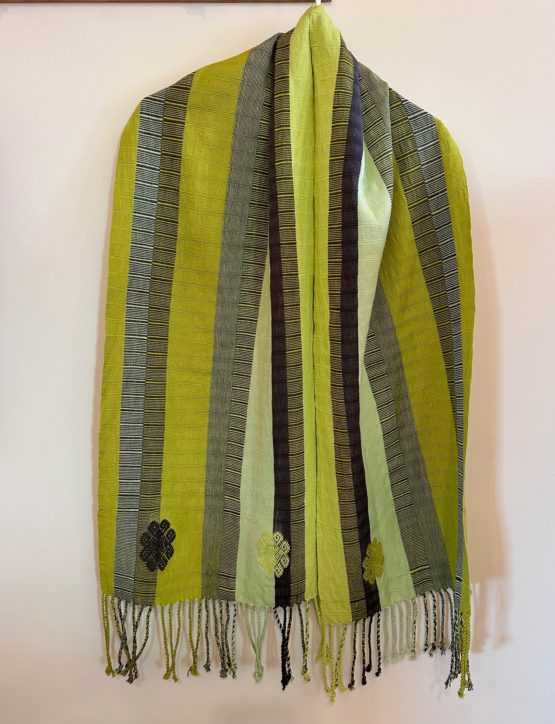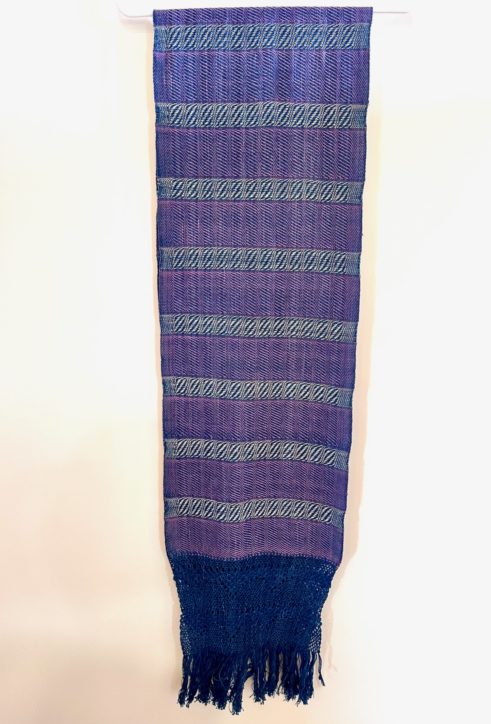I spent the morning with Estela Montaño and Edith Montaño Martínez at their home and workshop in Teotitlán del Valle, Oaxaca. Xi-Guía is the name of the town in Zapteco, the indigenous language here. We were filling out a grant application to WARP (Weave a Real Peace). They needed my help since they are not native Spanish writers, they don’t speak or write English, and their education did not take them beyond elementary and middle school.

Despite limited opportunities, these are very talented weavers and seamstresses, and they established a cooperative of twelve women fifteen years ago. They adapted traditional rug weaving done by men to weave small size tapestries. These are then sewn into beautiful handbags of all sizes, from coin purses to back-packs and overnight bags, using industrial strength sewing machines and old Singer treadles.
When I found them over ten years ago, what I noticed first was the quality of construction: the tightness of weave, the impeccably sewn lining with two pouches, the zippered closure, and the securely fastened fine grain leather straps. The colors they use are derived from natural plants and cochineal. These bags are built to last a lifetime! It’s true.

When I sat with them today, we talked in depth about what it takes to operate their business and what they would accomplish if they were to get funding from WARP. We set about creating a budget for their request, and a justification for support. But, in the process, what I discovered was they are not charging enough per bag to cover their costs–labor and materials.
Each weaver is getting paid about $3 USD per hour — hardly a living wage. Their materials expense includes wool, dye materials (indigo and cochineal costs upwards of $300USD per kilo, a 40% increase in the last two years), fabric for linings, zippers, leather, and metal hooks and grommets. It takes about 20 hours to make one bag, start to finish.
So, I ran through the numbers with them and we determined that their actual costs to make a large bag is 2,198 pesos, not the 1,400 pesos they have been charging, and this does NOT include even a small mark-up. It’s no wonder they have no reserve to reinvest in materials and why they need support. I have counseled them to raise prices to cover costs, plus make a small profit.

I have also asked them to consider how to find more venues where they can sell directly. In addition to selling from their home, where they get occasional visitors, they sell to three galleries in Oaxaca City. However, each one asks them to sell the 1,400 pesos bag at a wholesale price of 920 pesos. If they try to negotiate, the gallery managers will tell them they will invite other artisans who will sell for less. In addition, if they agree for tour operators to bring people to them, the operators charge a 30-50% commission on any sales.
Their workshop is usually on our Tlacolula Valley Folk Art Tour, and because the quality of what they make is extraordinary (and, they are very good people), we try to include them whenever we can.
Many visitors still come to Oaxaca hoping to score a bargain, even when pieces are priced fairly for the amount of work and quality that goes into making them. Today, I was astounded that my friends have been working so long and they are paying to keep their business going out of pocket, never receiving any financial counseling, and caring more about making something beautiful.


We talked about justice and setting a price that is just for them — in other words, we talked about fair trade — what is fair for the maker and what is fair for the customer. Such an important topic now.








Chiapas Textile Cooperative to Exhibit and Sell at Oaxaca Textile Museum
After calling ahead and making an appointment, we took a taxi to the outskirts of San Cristobal de las Casas at the end of a dirt road to find the headquarters of Camino de los Altos. This is a cooperative of 130 weavers who make extraordinary textiles.
They will be exhibiting and selling their work at the Museo Textil de Oaxaca from Friday through Sunday, February 17-19, 2012. If you are in Oaxaca, you won’t want to miss this event!
The cooperative began in the mid-1990’s by eight French designers who had a passion for Mayan traditions, textiles, and indigenous design. El Camino selects ancient traditional colors and re-imagines them. They produce bags, children’s clothing, pillow covers, scarves, shawls, table cloths, runners, napkins, and dish towels on sturdy, highest quality fabric that is hand-woven on back strap looms in five Chiapas weaving villages. Six sales are held each year in Paris and at other selected locations around the world.
Wool pillow covers can be the natural color of the sheep or dyed with either palo de Brazil or cochineal to yield a rich red. Mayan women then embellish them with traditional hand-embroidered designs. The cotton is dyed with industrial color. The color combinations are juicy and intense, and based upon traditional weaving patterns, too.
As a cooperative, the members meet together to decide next steps, new design and color directions, and pattern innovations. Their commitment is to each other — everyone must have work. The marketplace speaks, so together they determine what needs to be altered, adapted, changed or discontinued.
[Cultural note: In traditional villages, the men work in the fields and do required community service (cargos). Women are responsible for all the household work, and care for children and in-laws. We hear that many of the women who are now able to earn their own income through weaving and other crafts, choose not to marry to achieve some level of independence.]
El Camino de los Altos operates through the sale of their work and the support of a French foundation, and are able to employ four full-time staff. The money they earn goes directly to the weavers. In addition, they are training indigenous women in marketing, sales, production, inventory control and other business development aspects that will ensure ongoing success.
A Chiapas retail store, Madre Tierra, sells Camino de los Altos textiles. It is located across from the sweets market on Insurgentes in the courtyard behind the fabulous bakery that sells the most delicious whole grain onion garlic buns.
Contact: Veronique Tesseraud, director, elcaminodelosaltos@gmail.com, (967) 631-6944. Barrio de Cuxtitali, Cerrada Prolongacion Peje de Oro #3. http://elcaminodelosaltos.blogspot.com/
Like this:
8 Comments
Posted in Cultural Commentary, Oaxaca Mexico art and culture, Textiles, Tapestries & Weaving, Travel & Tourism
Tagged backstrap loom, blogsherpa, Chiapas, El Camino de Los Altos, fiber art, Mayan, Mexico, Oaxaca, textiles, weavers, women's cooperative